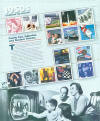Various popular books and articles are written
that label various generations (about 20-30 years) in world history and U.S.
history as having identifiable characteristics and influences on history and
culture. These are rather speculative and there are a wide range of opinions as
to how accurate or valid such labels might be. However, they are referred to and
used extensively in the political, business/marketing and popular culture. Neil
Howe and William Strauss have publish a number of books on the subject (Howe and
Strauss 1992-2000). It is true that history influences generations and in turn
generations influence history. Critical events, crisis, and innovations are
responded to by a generation born at a particular time and growing to adulthood.
The events, etc. are caused by previous generations, but influence those growing
up during the time and needing to face the consequences as adults. For instance
a war which results from actions of earlier generations yet the soldiers that
must fight and sacrifice are mostly from the youngest adults.
|
Generation |
Birth Years |
Events |
| Lost Generation |
1883-1910 |
Progressive Era-WWI, Roaring '20s; Electricity/Auto |
| Greatest Generation |
1911-1944 |
Depression; WWII |
| Baby Boomers |
1946-1965 |
Post WWII, TV: Cold War/ Nuclear; 1950s and 1960s Civil Rights and
anti War |
| Generation X |
1966-1986 |
Mass Media and Computers |
| Generation Y |
1987-2001 |
End of Cold War, Global Terrorism, increase of Fundamental Religions |
| Generation Z |
2001- |
Post 9/11, Micro/Mc world; wireless, Global Warming; Stem
Cell/Genome |
Unfortunately, these labels open the door to generalizations
that stigmatize all members of a particular group. It is part of a tendency to
want to understand complex phenomena by generating a classification system that
tends to lump together more diverse elements. America has diversity in its
generations as well from region to region. Cutting edge changes tend to be
focused on the West and East coast and in the urban areas. Changes in
communication with e-mail wireless networks, internet, etc. brings all areas up
to sped for good or bad. This is also occurring at a global level. As we enter
the 21st century many scholar have reassessed the 20th century by generation or
even by decade. Recently the US Postal Service issued a series of stamps
reflecting significant events and contributions by decades from 1900- 2000.
 The
1950's covers the beginning of the Baby Boomers which resulted from post war
prosperity. The various elements of what was important can also be
controversial. Certainly TV is a big impact, but the slinky is memorable but not
of great influence culturally.
The
1950's covers the beginning of the Baby Boomers which resulted from post war
prosperity. The various elements of what was important can also be
controversial. Certainly TV is a big impact, but the slinky is memorable but not
of great influence culturally.
 The
1950's covers the beginning of the Baby Boomers which resulted from post war
prosperity. The various elements of what was important can also be
controversial. Certainly TV is a big impact, but the slinky is memorable but not
of great influence culturally.
The
1950's covers the beginning of the Baby Boomers which resulted from post war
prosperity. The various elements of what was important can also be
controversial. Certainly TV is a big impact, but the slinky is memorable but not
of great influence culturally.